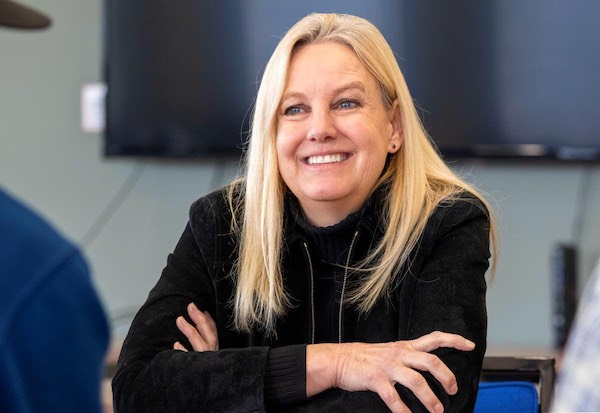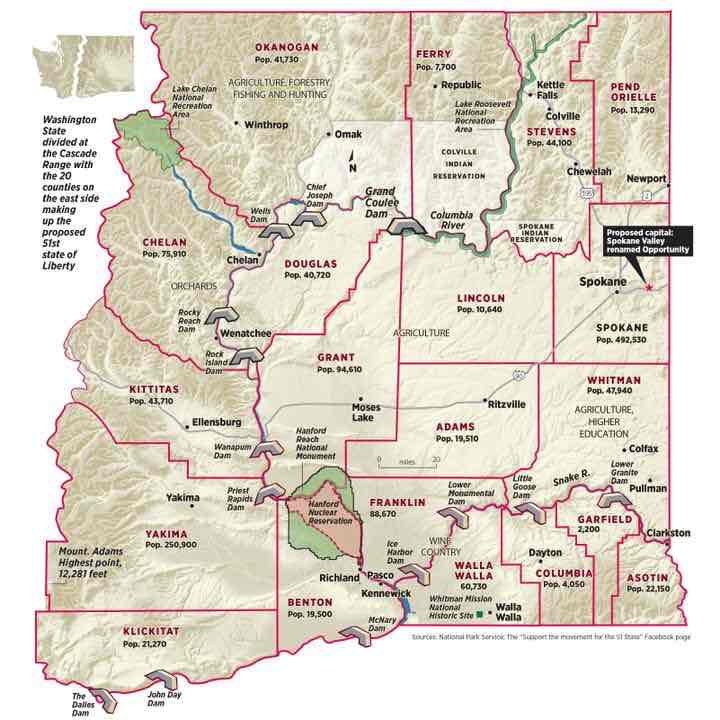forum
library
tutorial
contact

Schmick, Dye Reflect
on Legislative Session
by William Spence
Moscow-Pullman Daily News, May 31, 2019
|
the film forum library tutorial contact |

|
Schmick, Dye Reflect
by William Spence
|
Eastern Washington lawmakers aren't as enthused as Democratic governor
 Washington Gov. Jay Inslee found plenty to crow about during the 2019 legislative session, but for two local lawmakers it proved to be a bit of a mixed bag.
Washington Gov. Jay Inslee found plenty to crow about during the 2019 legislative session, but for two local lawmakers it proved to be a bit of a mixed bag.
In a meeting with Lewiston Tribune editors and reporters Thursday, Reps. Mary Dye, R-Pomeroy, and Joe Schmick, R-Colfax, offered their take on the 105-day session, which ended April 28.
Schmick, who has served in the Legislature since 2007, described it as "the most frustrating and most rewarding session I've ever had."
The frustrations stemmed from the more than $800 million in new and higher taxes that Democrats approved, despite already record revenue projections. The additional money was needed to balance the 2019-21 general fund budget, which weighed in at $52.4 billion -- an increase of 17.4 percent, or $7.8 billion, from the current biennium.
Since 2013, state spending has jumped by more than $18.5 billion, or nearly 55 percent.
At the opposite end of the scale, Schmick was pleased to play a central role in the revamp of Washington's behavioral health system. Four separate bills passed the House and Senate unanimously, including one Schmick sponsored to expand community-based mental health services.
"We now have a plan for mental health, which we've never had before," he said.
That plan includes funding for a new teaching hospital at the University of Washington, to train medical professionals in how to deal with mental health issues, as well as more money for community treatment and mental health courts, better integration of services and future capital improvements at Western State Hospital in Lakewood, Wash.
"Every one of my suggestions made it into the final policy, which is why (the session) was so rewarding," Schmick said.
Building upon her successful efforts last year, Dye continued to push for the development of high-speed broadband services in rural areas through private-public partnerships. Although Inslee took a different tack with his proposal, she was still able to negotiate changes and ultimately supported the governor's bill.
"We're moving forward," Dye said. "I think now they realize that, if we create the right incentives, we can bring private investment to small, rural communities."
Overall, however, Dye saw the 2019 session as a continued assault on eastern Washington's conservative values. In one op-ed piece, for example, she suggested the session featured "the most destructive legislation in our state's history."
 Topping the list was the governor's "green energy" agenda, as well as ongoing efforts to remove the Snake River dams -- a move she described as an "existential threat" to eastern Washington.
Topping the list was the governor's "green energy" agenda, as well as ongoing efforts to remove the Snake River dams -- a move she described as an "existential threat" to eastern Washington.
"I left (the session) thinking they're going to win this time," Dye said, although she admitted she flips back and forth on that view.
Given that some of the dam-removal talk is driven by concerns about the Puget Sound orca population, Dye suggested several less-drastic steps need to be taken before any dams are breached.
For example, the Puget Sound region should make infrastructure improvements to clean up solid waste runoff and eliminate accidental sewage spills. Blocked culverts that prevent salmon from reaching spawning habitat within the Puget Sound basin also need to be reopened, she said, and smaller dams that lack fish passages should be retrofitted.
"Until we develop the political will with the 3.5 million people in the Puget Sound area to do the right thing in their own neighborhood, then the (Snake River) dams should stay where they're at," Dye said.
She suggested the talk about dam removal was symptomatic of Olympia's lack of concern for eastern Washington. She also sees it as fodder for the "Liberty State" movement, which seeks to create a 51st state emcompassing rural portions of Washington, Oregon and Idaho.
That movement "illustrates how disenfranchised people feel on this side of the state," Dye said. When the Snake River dams are seen as disposable, "their interests not only aren't being represented, they're being attacked. I think we'd be wise to start listening to their concerns."
Together with Sen. Mark Schoesler, R-Ritzville, the two 9th District representatives voted against most of the bills Inslee held up as successes from the session.
One area where the three disagreed slightly was on legislation raising the legal age for purchasing tobacco and vaping products from 18 to 21. Dye supported the bill, which was signed into law; Schmick and Schoesler opposed the measure.
"I took a vote of conscience," Dye said. "I took a vote as a parent. There are a lot of temptations in the world. Maybe this one little roadblock will help prevent someone from getting addicted."
Public health officials say raising the tobacco age to 21 is the single best policy decision lawmakers can make to reduce smoking and nicotine addiction.
Schmick said he would support raising the legal age to 19, to make it harder for high school students to buy cigarettes. However, he noted that cigarettes and tobacco are still legal products.
"I trust people to make decisions on their own, without the government telling them what to do," he said. "And possession isn't against the law. If we really want to crack down (on tobacco use), possession shouldn't be legal."
Related Pages:
Schmick, Dye Discuss Dams, Taxes and Death Penalty by Anthony Kuipers, Moscow-Pullman Daily News, 3/22/19
learn more on topics covered in the film
see the video
read the script
learn the songs
discussion forum
